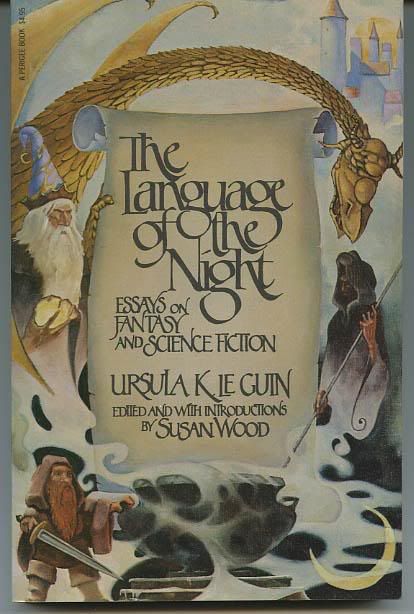Le Guin, Ursula K.: The Language of the Night

The Language of the Night: Essays on Fantasy & Science Fiction
Writer: Ursula K. Le Guin
Genre: Literature (Essays)
Pages: 270
It never fails that I always read the Le Guin critical essays, even when I'm not required to do so. I've been wanting to read this particular book for a long time, but I'd always hoped that maybe the publisher would re-release it, and I could get a spiffy new cover instead of tracking down a used copy. I still hope that, but since digitalclone read this as her critical text last year for SHU, I asked if I could borrow her copy and get it under my belt. She was happy to oblige.
The Language of the Night, I've been told, is one of the first critical texts that focused on fantasy and SF. Published in 1979, Le Guin breaks down her perspectives on the genre and her own work, as well as where she hopes to see the genres go. Funny, that, since I'm reading this in 2007, nearly thirty years later. It's also disturbing how the SF community still wrestles with the same issues, with seemingly little change. After all, we're still talking about the lack of women writing SF, aren't we? We're still talking about art versus entertainment. People still long for the "Golden Age" of SF, which Le Guin brands as the "Golden Ghetto." People are still talking about SF breaking out of its shell, about the need of SF to reinvent itself instead of relying on old tropes. People still talk about writing for the market versus writing from oneself.
So despite the publication date, Le Guin's essays are frightenly applicable, if in some cases a wee bit dated. Though, she got a pure jolt out of me in "The Stone Ax and the Muskoxen," a speech she gave at the 33rd World Science Fiction Convention in August of 1975, where she says, "We're not here to make a new law, to declare a war, or fix the price per barrel of crude oil." (emphasis mine).
Things really don't change, do they?
Back to the book, it's not just for SF readers and writers alike. Le Guin is also a fantasist, and several essays reveal that. She talks about the themes and metaphors in fantasy, how labeling the genre as "escapist" is missing the point. She also has several insightful essays focusing on Tolkien's The Lord of the Rings and Yevgeny Zamyatin's We. Then there's her responses to her own work, about her process at the time, and blast if she hasn't gotten me wanting to go out and buy everything I don't already own of hers and read it in one fell swoop.
Despite its age, this is a book I would recommend to any SF or fantasy writer. The sooner you read it, the better. It gets you thinking, and most likely, it'll get you thinking outside the market-driven box we hear about so often. For me, reading these essays is like getting back in touch with a part of my writer self I've been pushing back the past few years. I know I have a long way to go in terms of my craft, and reading these essays reminds me of that. But they also make me feel that I've got the spark of something right, and the only way to nurture that spark is to keep writing.
So writers of the SF/F persuasion? Go get this book. You may find used copies on Amazon.com, but my used online bookstore of choice is abebooks.com. I need to own this book. And if you write SF/F, you do too.
Next up: Brasyl by Ian McDonald